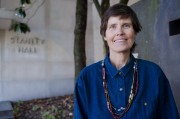Older Workers Spend Less on Necessities and Health Care
October 1st, 2009
COLUMBIA, Mo. – More older Americans are choosing to continue to work or are returning to the labor force. The number of workers age 65 and older is predicted to increase by more than 80 percent by 2016. In an ongoing study, University of Missouri researchers are examining the financial motivations of older working Americans. New results reveal that older workers spend less money on necessities, including housing and food, and health care than older non-workers.

Deanna Sharpe, associate professor of personal financial planning (PFP) in the MU College of Human Environmental Sciences.
“The recent increase of older adults in the work force has raised some interesting questions that previous studies haven’t answered – are older people working to meet financial needs, and are workers spending differently than non-workers?” said Deanna Sharpe, associate professor of personal financial planning (PFP) in the MU College of Human Environmental Sciences. “In this study, we found that older workers aren’t necessarily working because they have to, and their spending patterns are very different compared to those of non-workers.”
Using data from the 2005 Consumer Expenditure Interview Survey, MU researchers compared the financial budgets and expenditures of people ages 55-74 in working and retired households. They found that older workers spent more on transportation, eating out, education and insurance, while non-workers spent more on health care, cash contributions, food and housing. Older workers also had lower out-of-pocket costs for health expenses.
“Older workers spend less on necessities, including food and housing, which implies they aren’t working out of need,” Sharpe said. “They also are spending less on health care, which may indicate that workers are somewhat healthier than non-workers.”
The study, “Spending Patterns of Older Workers,” won the AARP Public Policy Institute Financial Service and Older Consumer Best Paper Award at the 2009 Joint Conference of the American Council on Consumer Interests/American Agricultural Economic Association. Tansel Yilmazer, assistant professor in PFP, co-authored the study.

